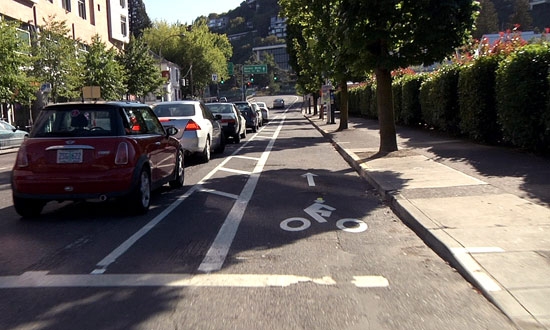OTREC Director Talks Bikes In Canada

On May 25, OTREC Director Jennifer Dill traveled to Vancouver, B.C. to talk about the impact of new bike lane facilities in downtown Portland. The conference, Changing Lanes, was about improving bike-car relationships on Canada’s roads. The conference attracted leading international and domestic experts to discuss issues and research on bike/car safety, infrastructure and the business opportunities and costs of increasing bike use in cities.
Dill participated in the panel discussion “Building A Better Connection: How Can We Build Infrastructure That Supports A Smoother Relationship For Drivers and Cyclists” (Watch the discussion here). She was joined by Erick Villagomez, professor at the University of British Columbia School of Architecture; Luci Moraes, transportation planner for the city of Surrey, B.C.; Darryl Young, urban planner and steering committee member for the Toronto Coalition for Active Transportation; and Councilor Geoff Meggs of the city of Vancouver.
Dill presented research performed by OTREC on the reactions of cyclists, motorists and pedestrians to new bike facilities. In the summer of 2009, the city of Portland installed a cycle track on SW Broadway near PSU’s campus which served as the primary study area. Researchers surveyed users in the area to gauge their reactions.
“Overall, Portland’s reactions (to the new bike facilities) are generally positive,” Dill said. “The buffered lanes cause some confusion, but motorists appreciate the predictability of a space for bikes and a space for cars.”
The few negative reactions were a result of conflicts between pedestrians and cyclists, Dill said. This was due to unclear markings and pedestrians standing in the cycle track between classes or while waiting for the bus.
While Portland has installed cycle tracks and divided bike lanes in its downtown by removing car travel lanes, Dill learned at the conference that Vancouver removed parking to install bike facilities. This change resulted in some negative backlash in Vancouver, leading to the conference, Dill said.
Public outreach is an important component to garnering positive public reactions to new traffic facilities, Dill said. Portland officials did extensive outreach before and after the cycle track was installed. That’s not to say that Canada is anti-bike, however. Many of the Canadian Automobile Association members ride bikes and the city’s auto clubs offer roadside assistance to cyclists, Dill said.
“As we get more multi-modal, we will need to stop characterizing people as just motorists or just cyclists,” Dill said. “People are all these things throughout the week.”
